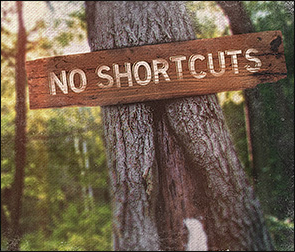The Long Road
Recovery requires hard work and tough choices.
 To truly recover from addiction is a process, one that requires deeper and more lasting changes than simply acknowledging the errors of a life controlled by alcohol or drugs. The process of real recovery involves more than an apology for hurtful behaviors and faulty judgment, more than a moment or a day of clarity, and more than a cry for help, no matter how sincere. Recovery is a long journey that requires profound and difficult changes, changes both in how the brain works and in how a person responds to life’s events.
To truly recover from addiction is a process, one that requires deeper and more lasting changes than simply acknowledging the errors of a life controlled by alcohol or drugs. The process of real recovery involves more than an apology for hurtful behaviors and faulty judgment, more than a moment or a day of clarity, and more than a cry for help, no matter how sincere. Recovery is a long journey that requires profound and difficult changes, changes both in how the brain works and in how a person responds to life’s events.
Addiction re-programs the brain in ways that make harmful choices seem like appropriate responses to day-to-day experiences. For a person living with addiction, drug use is neurologically connected to escape, relaxation, and reward; at an unconscious level, part of the brain has learned to define “using” as a valid reaction to challenges.
The ongoing work of recovery is a process of re-training that takes time, practice, and discipline. Consider similar processes that we experience as we grow up: whether we are learning to ride a bicycle, to swim, or to multiply and divide, we spend time repeating the tasks involved over and over until they become second nature. Once learned, these skills are hard to forget–years can go by without riding a bicycle, and yet we relearn to ride within a few minutes. Lessons that are well-established in our memory can be easily recalled.
Now, consider addiction. Over time, an individual has repeatedly used drugs or alcohol to respond to stress, anger, frustration, boredom, pain, trauma, and many other emotions. The brain has become programmed, and the individual has developed patterns that encompass addicted behavior. Knowing what we know about how easily well-learned lessons are recalled, how can we possibly expect change overnight, or in thirty days, or in even a year? And yet, more than 50% of the people who enter into treatment for addiction have no aftercare. They have no framework within which to keep their recovery moving forward, and are often unable to continue the serious work of learning to live differently. It should come as no surprise that relapse rates are high for these individuals.
We hear stories of people who suffer severe physical injuries and we admire their tenacity in regaining the use of their arms and legs. We know that this type of rehabilitation can take months, or even years. Yet all too often we assume that rehabilitation of the brain can happen in an instant. We assume that a moment of clear thinking indicates total recovery. What we forget is that the addicted person’s brain, just like the muscles of a soldier recovering from a battlefield injury, must learn new patterns and new ways to respond.
During the process of recovery, the addicted person must learn to think and respond in intensely different ways; when the brain says, “Go right,” the person must force themselves to go left. When the voice of their disease is triggered and cries out for alcohol or drugs, when well-worn pathways present themselves, the mind must be led in a new direction. Finding better responses and more appropriate solutions takes time, retraining, and sustained effort.
Many people struggle to acknowledge the time and practice required for true recovery to take place. But it is vitally important that those who live with addiction, as well as their families, spouses, and friends, understand just how unrealistic is the notion of the shortcut or the quick fix. Seeking a quick cure, one is unable to truly walk on the road of recovery. Addiction is a deadly disease, and the solutions that lead away from its destructive power all require hard work. It is only when we embrace the reality of recovery’s continuous journey that lasting results will be realized.

